Blogging Austin Briggs’ Flash Gordon, Part Two – “Freeland”
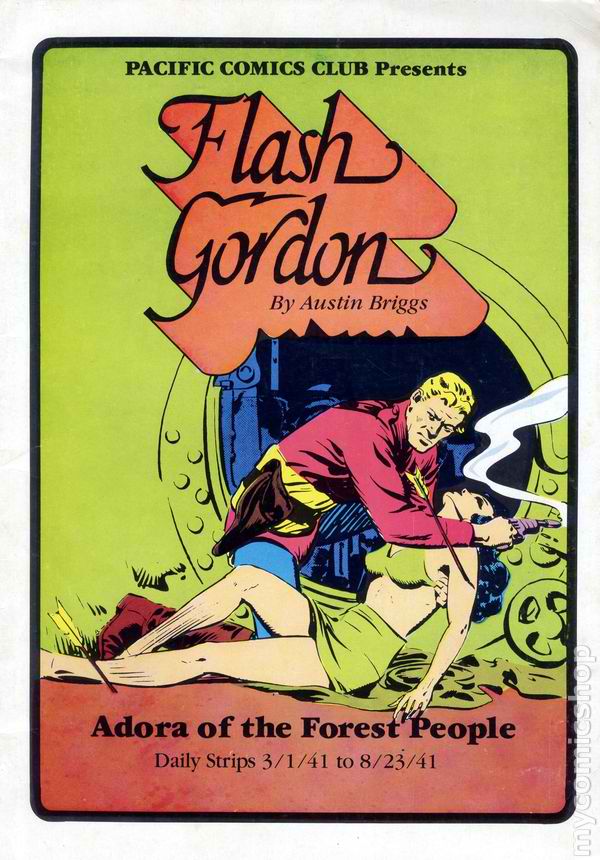
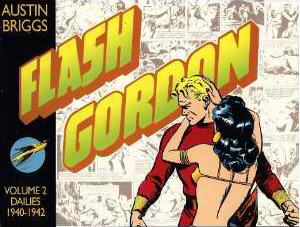 “Freeland” was the second installment of Austin Briggs’ Flash Gordon daily comic strip serial for King Features Syndicate. Originally published between February 24 and August 21, 1941, “Freeland” was the second story in the daily companion to Alex Raymond’s celebrated Sunday strip. It is the second of two Briggs strips available in a reprint collection from Kitchen Sink Press.
“Freeland” was the second installment of Austin Briggs’ Flash Gordon daily comic strip serial for King Features Syndicate. Originally published between February 24 and August 21, 1941, “Freeland” was the second story in the daily companion to Alex Raymond’s celebrated Sunday strip. It is the second of two Briggs strips available in a reprint collection from Kitchen Sink Press.
“Freeland” gets underway with the ship bearing our motley crew making its way toward the Promised Land free from Ming. Flash and Dale set out in a rocketship to scout for a safe harbor and encounter a hostile tribe of what appear to be Native Americans.
Once more, Austin Briggs demonstrates his version of Mongo is more attuned to contemporary American experience or American history than the prehistoric or Medieval Europe model chosen by Alex Raymond. Briggs may also be borrowing a page from Edgar Rice Burroughs (one of Raymond’s primary inspirations) in transplanting Native Americans to another world.
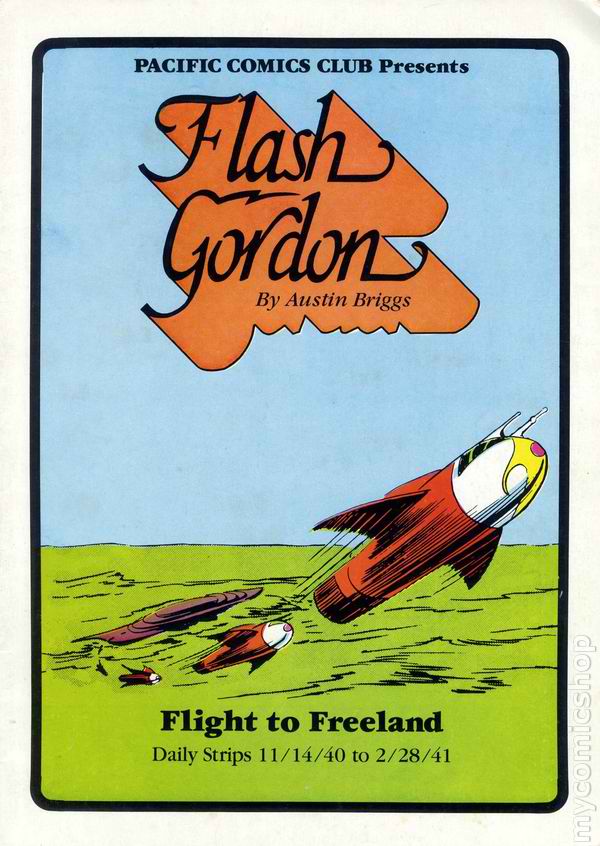
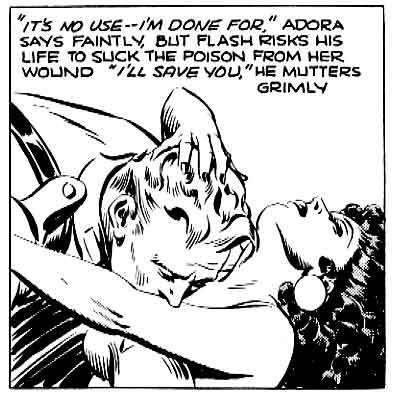 Having settled in their new home, the crew of the ship Freedom begins exploring the forest and constructing makeshift shelters. While hunting for food, Fierro inadvertently kills one of the natives. Regon, a warrior betrothed to Princess Adora urges the Princess’ father, King Sagam to retaliate. Flash is furious with Fierro because he realizes this has doomed their chance of making peace with the natives.
Having settled in their new home, the crew of the ship Freedom begins exploring the forest and constructing makeshift shelters. While hunting for food, Fierro inadvertently kills one of the natives. Regon, a warrior betrothed to Princess Adora urges the Princess’ father, King Sagam to retaliate. Flash is furious with Fierro because he realizes this has doomed their chance of making peace with the natives.
Flash and Fierro are brutally beaten by the natives who prepare to burn them at the stake. Princess Adora saves them from death by declaring that she has chosen Flash for her mate. While they are spared one deadly fate, an enraged Regon challenges Flash to a duel to the death for the Princess’ hand. Flash bests Regon in combat, but spares his life. King Sagam still demands that Flash marry his daughter per the custom of the tribe.
A protracted bit of business ensues with Totim, the tribe’s Medicine Man giving Flash a potion that wipes his memory so that he will not object to marrying Adora. Dale and Zarkov attempt to rescue Flash and Fierro only to be captured by the natives themselves. King Sagam orders their execution, but Flash objects leading to a spat with Princess Adora.
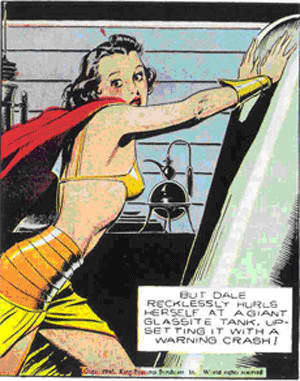
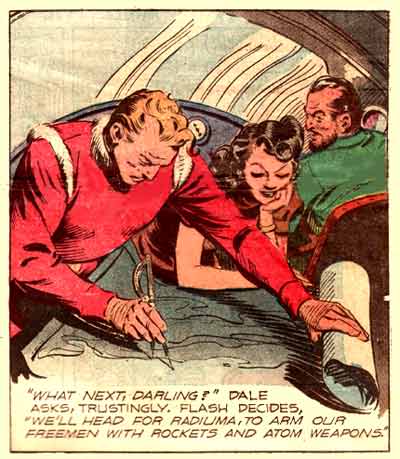 Zarkov escapes from his bonds and forces Totim to prepare a potion to restore Flash’s memory. Flash then forces the Medicine Man to prepare a love potion to make Princess Adora fall in love with Regon once more. While the scheme works, King Sagam is outraged and declares war on Flash and the others.
Zarkov escapes from his bonds and forces Totim to prepare a potion to restore Flash’s memory. Flash then forces the Medicine Man to prepare a love potion to make Princess Adora fall in love with Regon once more. While the scheme works, King Sagam is outraged and declares war on Flash and the others.
Adora and Regon join Flash, Dale, Zarkov, and Fierro in fleeing to the ship where the Princess and her betrothed are married. King Sagam will not relent and a long series of attacks, sabotage, and other terrorist activity follow. It is clear that Austin Briggs was using the conflict with the natives as a commentary on the War in Europe at the time for the savagery of the tank and aerial assaults on the land with high casualties on both sides.
Surprisingly, Briggs always makes it clear that war is to be avoided and never stops showing the pain it causes Princess Adora who, despite having defected, hates to see what the war has done to her people. Her father, King Sagam is the hawkish character who refuses to end the hostilities. Of course, he meets a just fate, but not before murdering the otherwise noble Totim.
While Adora and her husband are eventually reunited (Regon having been a prisoner of war for much of the hostilities and, for a time, believed dead), Briggs has Flash reject Dale temporarily because of her cruelty in acting out of petty jealousy toward Adora. It can be argued that Briggs uses Dale’s jealousy as a commentary on blind nationalism clouding individuals’ moral judgment. The storyline concludes (in a parallel with Alex Raymond’s “Fall of Ming” storyline in the Sunday strip) with Flash, Dale, and Zarkov learning of the War in Europe and hurrying home to Earth to help restore peace there. While we have seen the “Invasion of the Red Sword” depicted in the Sunday strips, Briggs’ remaining months on the daily strip remain uncollected at present. However, with his first two stories it is undeniable that he proved himself a worthy successor to Alex Raymond in chronicling his immortal hero’s continuing adventures.
William Patrick Maynard was authorized to continue Sax Rohmer’s Fu Manchu thrillers beginning with The Terror of Fu Manchu (2009; Black Coat Press). A sequel, The Destiny of Fu Manchu was published in April by Black Coat Press. Also forthcoming is a collection of short stories featuring an original Edwardian detective, The Occult Case Book of Shankar Hardwicke and an original hardboiled detective novel, Lawhead. To see additional articles by William, visit his blog at SetiSays.blogspot.com